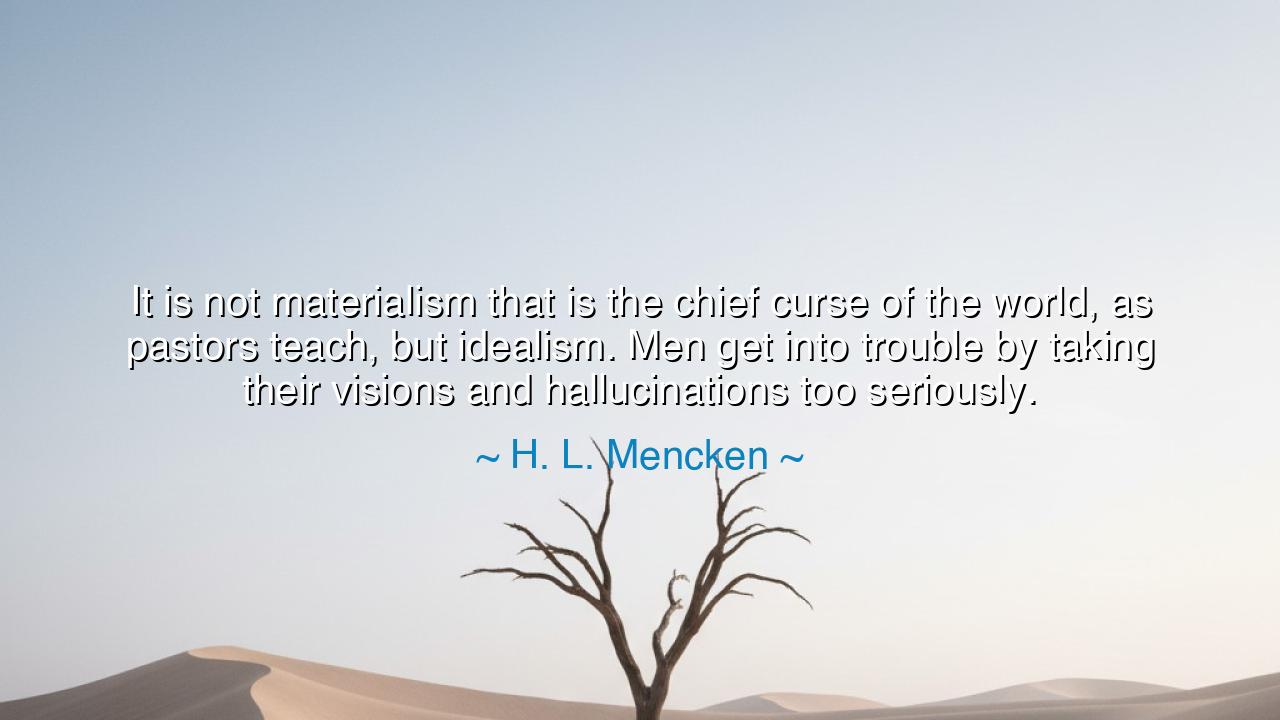
It is not materialism that is the chief curse of the world, as
It is not materialism that is the chief curse of the world, as pastors teach, but idealism. Men get into trouble by taking their visions and hallucinations too seriously.






Hear now, O seekers of wisdom, a truth that resonates like the sound of thunder across the heavens, a truth that speaks to the very heart of the human condition. It is not the materialism of the world that binds us, as many would have us believe, but a far more dangerous foe—the idealism that blinds the soul. H. L. Mencken, a man of sharp insight, declared with piercing clarity: "It is not materialism that is the chief curse of the world, as pastors teach, but idealism. Men get into trouble by taking their visions and hallucinations too seriously." These words, though spoken long ago, carry the weight of timeless wisdom.
In every age, there are those who seek to impose their visions of a perfect world, whether through the lens of religion, politics, or philosophy. Idealism is a powerful force, one that inspires movements, ignites revolutions, and brings dreams into the waking world. But, like a fire that grows too large, it can consume all in its path. To hold an ideal in one’s heart is not wrong, for it is the foundation of ambition, of hope, and of the desire to create something greater. But to hold that ideal too tightly, to believe that it is the only truth, is to invite ruin.
Think, O children of wisdom, of the great conquerors who sought to reshape the world according to their ideals. Napoleon Bonaparte, with his vision of a new empire, believed that he could reshape Europe through sheer will. His idealism drove him to battles that cost the lives of thousands, and in the end, it was his inability to temper his grand vision with the reality of the world that led to his downfall. Napoleon, like so many before him and after him, fell victim to the dangerous trap of idealism—he mistook his vision for the truth, and in doing so, he ignored the wisdom of the earth beneath his feet, the wisdom of the present moment.
Even in the great philosophers, we see the shadow of idealism. Plato, with his vision of the perfect world of Forms, sought to define an ideal realm beyond the physical. While his ideas were profound, it is said that in his pursuit of these lofty ideals, he lost touch with the practical realities of the world. In his attempt to shape society according to his perfect vision, he ignored the complexities and imperfections that make life what it is. His idealism, though it brought great thought to the world, also blinded him to the richness of the present. Plato, like many before and after him, was consumed by his own visions, and in doing so, he missed the wisdom that comes from engaging fully with the world as it is.
And so it is with all men and women who, driven by their visions, create realities that they cannot live within. For when we take our ideals too seriously, we forget that the world is a place of contradiction, of flux, of imperfection. It is a place where dreams must be tempered with the weight of human limitation. The true curse of the world, as Mencken saw it, is not the pursuit of material wealth or the craving for worldly possessions, but the delusion that we can perfect the world according to our own limited visions. The greatest dangers lie not in the things we possess, but in the illusions we chase.
The lesson here, O seekers, is clear: Idealism is a powerful force, but it must be wielded with caution. It is good to dream, to hope, and to strive for a better world, but we must always remain grounded in the present, in the realities of the world as it is, not as we wish it to be. Men and women have gotten into great trouble by elevating their visions above the practical realities of life. The world is not a canvas upon which we can paint our dreams—it is a living, breathing entity, with its own rhythms, its own struggles, and its own truths.
So, O children of wisdom, let your ideals guide you, but do not let them blind you. Engage with the world as it is, with all its imperfections, its contradictions, and its beauty. Hold your visions lightly, and allow them to be shaped by the winds of experience, for it is only in the marriage of idealism and realism that true wisdom is born. The world is full of dreamers, but it is the doers—those who temper their visions with humility and understanding—who change the world for the better. Let this be your guide, and you will walk the path of true wisdom.






AAdministratorAdministrator
Welcome, honored guests. Please leave a comment, we will respond soon